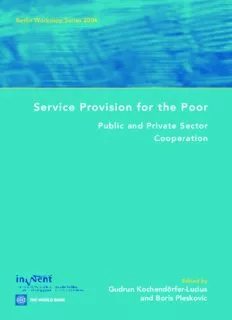
Service Provision for the Poor: Public and Private Sector Cooperation Berlin Workshop Series 2004 (Berlin Workshop Series) PDF
Preview Service Provision for the Poor: Public and Private Sector Cooperation Berlin Workshop Series 2004 (Berlin Workshop Series)
Berlin Workshop Series 2004 K o c h e annd dö Prfe lesr-L ku oc vicius 2 0 0 4 TheBerlin Workshop Series 2004 presents selected papers from meetings held July 8–10, Service Provision for the Poor 2002, at the fifth annual forum co-hosted by InWEnt and the World Bank in preparation S e for the Bank’s World Development Report. At the 2002 meetings, key researchers and r v policymakers from Europe, the United States, and developing countries met to identify and i c Public and Private Sector e brainstorm on development challenges and successes that were later examined in-depth in P the World Development Report 2004: Making Services Work for Poor People. r o Cooperation v i This volume presents papers from Berlin Workshop sessions on delivery, financing, incentives, si o and innovations in service provision—from the perspectives of nongovernmental organizations, n the private sector, and governments. fo r t h IN THIS VOLUME: e Introductory remarks by Gudrun Kochendörfer-Lucius and Boris Pleskovic; an opening address P o by Wolf-Dieter Eberwein; keynote addresses by Nicholas Stern and Boris Nemtsov; papers o by Daniele Giusti, Jeremy Hobbs, Kathy Bartlett and Anwar Poonawala, Michael Kremer, r Hema Viswanathan, Junaid Ahmad, Yuzhao Wang, Orvill Adams and William Savedoff, John Newman, Jean-Philippe Platteau, Mwatumu Malale, Olav Seim, and Thomas Wollenzien; and concluding remarks by Shantayanan Devarajan and Ritva Reinikka. B e r Slin e W r ieo sr 2ks 0h 0o Edited by 4p Gudrun Kochendörfer-Lucius and Boris Pleskovic ISBN 0-8213-5616-X Themes for the 6TH ANNUAL BERLIN WORKSHOP SERIES Berlin, Germany “INVESTMENT CLIMATE, GROWTH, AND POVERTY” September 3–5, 2003 Investment, Productivity, and Development Investor Perspectives on the Investment Climate Securing Property and Contractual Rights Finance Markets Regulation, Governance, and Corruption What Role for More Selective Interventions? Reforming the Investment Climate Service Provision for the Poor Berlin Workshop Series 2004 Service Provision for the Poor Public and Private Sector Cooperation Edited by Gudrun Kochendörfer-Lucius and Boris Pleskovic THE WORLD BANK Washington, D.C. © 2004 The International Bank for Reconstruction and Development / The World Bank 1818 H Street, NW Washington, DC 20433 Telephone 202-473-1000 Internet www.worldbank.org E-mail [email protected] All rights reserved. 1 2 3 4 07 06 05 04 The findings, interpretations, and conclusions expressed herein are those of the author(s) and do not necessarily reflect the views of the Board of Executive Directors of the World Bank or the governments they represent. The World Bank does not guarantee the accuracy of the data included in this work. The boundaries, colors, denominations, and other information shown on any map in this work do not imply any judgment on the part of the World Bank concerning the legal status of any territory or the endorsement or acceptance of such boundaries. Rights and Permissions The material in this work is copyrighted. Copying and/or transmitting portions or all of this work without permission may be a violation of applicable law. The World Bank encourages dissemination of its work and will normally grant permission promptly. For permission to photocopy or reprint any part of this work, please send a request with complete information to the Copyright Clearance Center, Inc., 222 Rosewood Drive, Danvers, MA 01923, USA, telephone 978-750-8400, fax 978-750-4470, www.copyright.com. All other queries on rights and licenses, including subsidiary rights, should be addressed to the Office of the Publisher, World Bank, 1818 H Street NW, Washington, DC 20433, USA, fax 202-522-2422, e-mail [email protected]. Edited by Gudrun Kochendörfer-Lucius and Boris Pleskovic. ISBN 0-8213-5616-X Contents ACKNOWLEDGMENTS vii INTRODUCTION 1 Gudrun Kochendörfer-Lucius and Boris Pleskovic OPENING ADDRESS 3 Making Services Work for Poor People: A Scholar’s Perspective Wolf-Dieter Eberwein KEYNOTE ADDRESSES Why Is a World Development Reporton Making Services Work 7 for Poor People Needed? Nicholas H. Stern Poverty in Russia 9 Boris Nemtsov The Role of Altruistically Motivated Organizations in Making Services Work for Poor People The Experience of the Private Not-for-Profit Health Sector in Uganda 17 Daniele Giusti Basic Services—A Basic Right 31 Jeremy Hobbs The Madrasa Early Childhood Programme in East Africa 35 Kathy Bartlett VI | CONTENTS The Role of the Private Sector Evidence from a Study of Vouchers for Private Schooling in Colombia 51 Michael Kremer The Rural Private Practitioner 59 Hema Viswanathan The Role of Local Governments Delivering Infrastructure: A Strategic Framework 69 Junaid K. Ahmad Employment of Farmers and Poverty Alleviation in China 81 Yuzhao Wang Incentives and Innovations Getting Health Services to the Poor: Incentives, Efficiency, 87 and Health System Performance Orvill Adams and William Savedoff Bolivia’s Plan for Achieving Education for All Goals 101 John Newman Rushing to Help the Poor through Participation May Be Self-Defeating 111 Jean-Philippe Platteau Modes of Financing Tanzania’s Experience with Education 123 Mwatumu J. Malale How Aid Modalities Influence the Effectiveness of Public Expenditures in 129 Developing Countries: A Bilateral Donor Perspective Olav H. Seim Financing Development 133 Thomas Wollenzien CONCLUSION 137 Making Services Work for Poor People Shantayanan Devarajan and Ritva Reinikka APPENDIXES 1. Program 153 2. Participants 157 Acknowledgments The planning and organization for the 2002 workshop involved a joint effort. We extend our special thanks for the support and advice of Nicholas H. Stern, senior vice president for development economics and chief economist of the World Bank at the time of the conference, and Shantayanan Devarajan and Ritva Reinikka, co-directors of the World Bank’s World Development Report 2004.We would also like to thank other staff members, in particular the conference coordinators, Irene Federwisch, Mantejwinder Jandu, Klaus Krüger, and Joachim Müller, whose excellent organiza- tional skills kept the workshop on track. Finally, we would like to thank the editorial staff, especially Alice Faintich, Kim Kelley, and Grit Schmalisch, for their work on this volume. VII
Description: